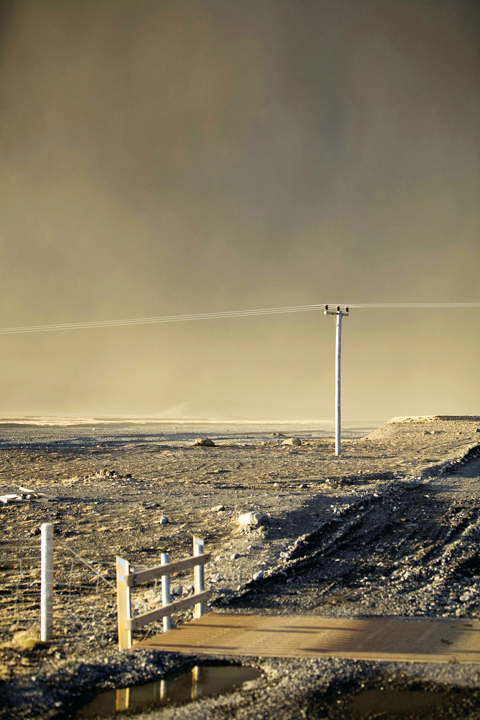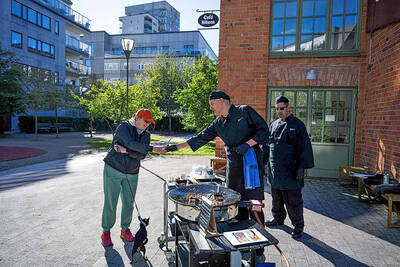A volcano erupts in Iceland, and the effects ripple around the globe: A mom in Romania frets about making her son’s wedding in Texas. A florist in New York worries shipments won’t arrive. Patients awaiting treatment in Nigeria have to wait another week for the doctors.
The fallout from the ash cloud looming over Europe illustrates just how interconnected our world has become.
Thousands of planes fly millions of passengers and tonnes of cargo each day, providing the economic lifeblood of nations and businesses. The flights deliver products for sale or items as small as a specialized tool that lets a factory keep operating.

PHOTO: REUTERS
The planes also bring medicines to hospitals and food aid to earthquake or hurricane victims. And they bring war and peace: Soldiers are often transported to and from hot spots by air.
Tales of woe and inconvenience span every social level, from the Norwegian prime minister who got stuck in New York and had to govern using his iPad, to ordinary people who saved money for trips of a lifetime, then had to abandon those plans.
The eruption was a single act of nature, but it stopped the world in countless ways.

PHOTO: AFP
• A Texas mom stranded in Europe fears that the travel disruptions could force her to miss her son’s wedding.
San Antonio native Nancy Price was to fly from Bucharest to Munich, on to Chicago and then south to Texas for the nuptials in San Antonio next Saturday. There’s no other way for her to get home.
Planning for the wedding is further complicated because the couple is being married by Price’s brother, Reverend Bert Clayton, a Methodist minister.
However, Clayton is in London with his wife. He’s to fly to the US on Wednesday, so he’s watching whether the travel disruption will continue.
Price has lived with her husband in a village north of Bucharest for the past 15 years. Ever the optimist, she says: “We are packing anyway.”
• Marathoners train for months to be ready for race day. They’re seasoned to overcome obstacles, but no one can outrun this volcano.
Many runners who have trained for tomorrow’s Boston Marathon may not get the chance to compete after being stranded by flights that never left the tarmac. David Gray missed last year’s race because of injury, and this was supposed to be the year he got the chance to climb Heartbreak Hill. Instead, he’s stuck in a hotel room in Brussels, Belgium.
“To have an act of God like this happen is really frustrating,” Gray said.
A 41-year-old television producer from New York City who has run twice in the New York Marathon, Gray has tried everything: He’s asked to be rerouted through Italy or Spain, figuring they were far enough south to avoid the ash cloud. However, the only way he can get to those countries is by train or rental car, and they are all booked.
He’s asked about flying out of Moscow, and going over the North Pole rather than the North Atlantic, but to no avail.
• Anissa Isker arrived at Charles de Gaulle Airport outside Paris in hopes of taking her son to Miami for specialized treatment that could help him walk. He has a rare genetic disease that keeps him in a wheelchair.
The hard-to-schedule treatment costs US$3,000, a sum she is set to lose if they cannot leave this weekend. The French civil aviation authority was keeping airports in northern France closed until at least yesterday.
“When I told him we cannot leave, he got nervous, because he understood the situation,” Isker said.
Across the Atlantic, Babafemi Adenuga faced a medical predicament of his own.
The family physician and medical professor at Howard University was supposed to lead a team of around 30 medical personnel to Nigeria to provide free care where it is badly needed.
However, their flight to Nigeria connects in Frankfurt, and it was canceled because of the volcanic ash. Adenuga was scrambling on Friday to get to Nigeria as soon as possible.
In Europe, potentially lifesaving organs were also stranded. A spokeswoman for the German Foundation for Organ Transplant said all organs that usually get flown out to patients were instead being distributed regionally.
With the airlines stalled, organs must now be delivered by land — and their recipients are chosen by distance.
• Oliver Dragojevic, a Croatian singer who has been hugely popular in the Balkans for 40 years, had a dream: To follow the steps of performers Frank Sinatra, Eric Clapton and Pavarotti and sing in the Royal Albert Hall.
And he might have made it if flights into London hadn’t been grounded — meaning that he and his band probably won’t reach London in time for tomorrow’s concert.
Ictinus Grupa, the agency that organized the concert, said the concert is “very much in question.” Booking another show at the Royal Albert Hall hasn’t happened yet.
“Of course I’d be very disappointed” if the concert is eventually canceled, Dragojevic said in a phone interview. “It was supposed to be a big thing for me.”
Fans from Croatia are devastated, too. Merlin Tours, a travel agency that was selling a four-day package to London starting yesterday, said they are flooded with calls from people who were scheduled to go.
• Mourners from across the world are expected in Poland today for the funeral of Polish president Lech Kaczynski. However, Alexander Lacherbauer-Lynn won’t be among them because no flight will take off in time.
Lacherbauer-Lynn grew up in Chicago, steeped in his Polish ancestry. His mother and father emigrated from Poland, he spoke Polish at home and he’s spent many of his summers in Poland.
The 20-year-old political science major at Loyola University jumped at the chance when a Polish parliamentarian invited him to attend the funeral of Kaczynski, who was killed in a plane crash in eastern Russian earlier this month.
Lacherbauer-Lynn said the pageantry and gathering of dignitaries for the state ceremony was a once-in-a-lifetime opportunity.
“It would have been very historic,” he said. “I don’t think anything like that will occur again.”
Other world leaders were inconvenienced, too. After getting stranded in New York City, the Norwegian prime minister discovered a new tool for governing from afar: Apple’s iPad.
A spokeswoman for Jens Stoltenberg said the prime minister’s return flight was canceled, so he began using his newly purchased device to keep in touch with his office back in Norway and to do work.
• Salmon and flowers are just two of the many products that are transported through Europe to destinations around the world. However, the ash cloud meant many restaurants, supermarkets and florists might not get their shipments.
In New York City’s Flower District, the Friday night flights from the Netherlands are a big deal. Thousands of dollars worth of tulips, peonies, daffodils and hundreds of other varieties come in by air, to be distributed starting Saturday morning. This weekend’s weddings won’t have Dutch flowers.
“This is the beginning of our busy season,” said Andrew D’Amore at wholesaler Fischer and Page. “We just hope it doesn’t go too much longer.”
David Pilat, designated seafood buyer for the giant Whole Foods Market, is worried about a silvery pink delicacy — Atlantic salmon.
The problem is that all of the suppliers of the fish are in Norway, Scotland, the British Shetland Islands and in Iceland.
Ironically, only the salmon farms in Iceland were able to ship fish because the ash cloud is blowing away from most of the island, Pilat said.
“I’ve been staying in constant touch with our logistic folks, and we have freight booked at London’s Heathrow Airport ready to go when they can,” he said.

READINESS: According to a survey of 2,000 people, 86 percent of Swedes believe the country is worth defending in the event of a military attack Swedes are stocking up on food items in case of war, as more conflict in Europe no longer feels like a distant possibility, and authorities encourage measures to boost readiness. At a civil preparedness fair in southwest Stockholm, 71-year-old Sirkka Petrykowska said that she is taking the prospect of hostilities seriously and preparing as much as she can. “I have bought a camping stove. I have taken a course on preservation in an old-fashioned way, where you can preserve vegetables, meat and fruit that lasts for 30 years without a refrigerator,” Petrykowska said. “I’ve set aside blankets for warmth, I

FRUSTRATIONS: One in seven youths in China and Indonesia are unemployed, and many in the region are stuck in low-productivity jobs, the World Bank said Young people across Asia are struggling to find good jobs, with many stuck in low-productivity work that the World Bank said could strain social stability as frustrations fuel a global wave of youth-led protests. The bank highlighted a persistent gap between younger and more experienced workers across several Asian economies in a regional economic update released yesterday, noting that one in seven young people in China and Indonesia are unemployed. The share of people now vulnerable to falling into poverty is now larger than the middle class in most countries, it said. “The employment rate is generally high, but the young struggle to

ENERGY SHIFT: A report by Ember suggests it is possible for the world to wean off polluting sources of power, such as coal and gas, even as demand for electricity surges Worldwide solar and wind power generation has outpaced electricity demand this year, and for the first time on record, renewable energies combined generated more power than coal, a new analysis said. Global solar generation grew by a record 31 percent in the first half of the year, while wind generation grew 7.7 percent, according to the report by the energy think tank Ember, which was released after midnight yesterday. Solar and wind generation combined grew by more than 400 terawatt hours, which was more than the increase in overall global demand during the same period, it said. The findings suggest it is

‘ARMED CONFLICT’: At least 21 people have died in such US attacks, while experts say the summary killings are illegal even if they target confirmed narcotics traffickers US forces on Friday carried out a strike on an alleged drug-smuggling boat off the coast of Venezuela, killing four people, US Secretary of Defense Pete Hegseth said. The latest strike, which Hegseth announced in a post on X, brings the number of such US attacks to at least four, leaving at least 21 people dead. An accompanying video shared by Hegseth showed a boat speeding across the waves before being engulfed in smoke and flames. “Four male narco-terrorists aboard the vessel were killed,” the Pentagon chief wrote. He said the strike “was conducted in international waters just off the